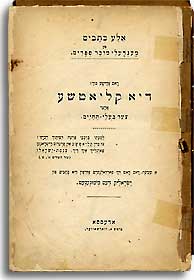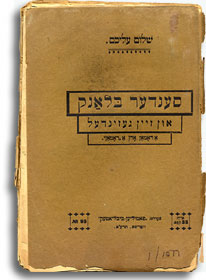==The Fathers of Yiddish Literature (Continued)==
The three most prominent first-generation writers of modern Yiddish literature were Sholem Yankev Abramovich, Sholem Naumovich Rabinovich, and Isaac Leib Peretz ((Howe, 2004)).

Cover page of "Di Klyatshe" (The Mare), by Mendele Moykher Sforim from 1889

Cover of "Sender Blank un Zayn Gezindel" (Sender Blank and His Clan), by Sholem Aleichem
===More Information on Sholem Aleichem===
Although he was traditionally educated, Sholem Naumovich Rabinovich was not a Talmudic scholar. After attending a Russia secular school, he became well-read and versed in Russian society ((Aproot et. al, 1999)). He grew up in Voronko, Russia. After 1891 he lived in Odessa and eventually Kiev. Due to fear of the pogroms, he left Russia in 1905 and moved to New York City. His family, however, moved to Genera, Switzerland. After being unable to support himself in New York and his family, he soon moved to Switzerland to join his family ((Aproot et. al, 1999)). In 1908 he was diagnosed with tuberculosis. In 1914 he and his family immigrated to the Lower East Side. His son, however, had caught tuberculosis and remained behind in Switzerland. Soon after his son passed away, placing him into a profound state of depression. He passed away one year later. His funeral was one of the largest in the history of New York City, with thousands of mourners attending ((Aproot et. al, 1999)).
===The Yiddish Writers of the Second Generation===
The “fathers of Yiddish literature” all inspired the second generation of Yiddish writers, who distinguished themselves in nearly all literary genres and often dealt with more universal subjects such as nature, urban life, and love ((Greenspoon, 1998)). A sudden outburst of Yiddish literature began to arise, from fiction to poetry. A large group of Yiddish writers began to establish themselves in the East European Jewish community, including S. Anski, and I. J. Singer.
S. Anski is noted for his 1914 play, The Dybbuk. Click here to learn more about the play.

Leave a Reply
You have to register to add a comment.